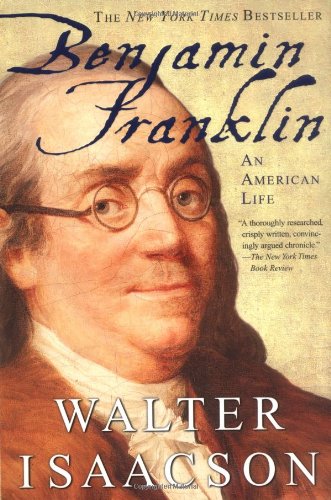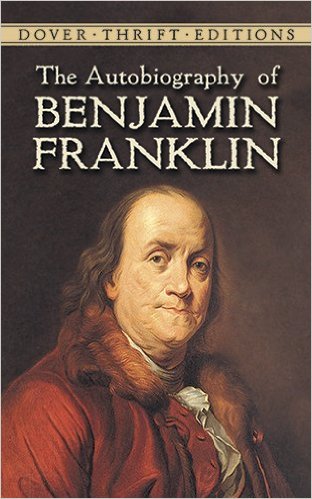I’d been meaning to read a proper biography of Benjamin Franklin, having previously read his famous autobiography, and now finally have. Benjamin Franklin: An American Life by Walter Isaacson gives a full account of his life and his numerous contributions not just to the creation and founding of the United States, but to humanity in general through his many inventions and scientific discoveries. Besides these great contributions Franklin is also remembered for his list of twelve virtues which he famously practiced in an effort at self-improvement, one of which he also frequently encouraged others to practice is frugality as a means of not just becoming wealthy, but to better aid mankind.
In addition to frugality Franklin also commonly espoused the virtue of industry, for together they allow one to secure a sufficient living to support oneself and not be indebted to others. For by remaining debt-free one can live for oneself and not be subject to the whims of others when payment comes due.
Perhaps the largest platform Franklin used to attempt to spread these virtues was in his Poor Richard’s Almanac in which they were a major theme, as Isaacson points out:
Frugality became for him not only a virtue but also a pleasure. “Industry and frugality,” he wrote in describing the theme of Poor Richard’s almanacs, are “the means of procuring wealth and thereby securing virtue.”
Franklin did not just practice virtues for his own personal improvement, but also tried to help encourage others to improve themselves and become part of the growing middle class at the time. Even as a child Franklin was already practicing the virtue of frugality, as Isaacson explains:
As a young apprentice, Franklin had read a book extolling vegetarianism. He embraced the diet, but not just for moral and health reasons. His main motive was financial: it enabled him to take the money his brother alloted him for food and save half for books. While his coworkers went off for hearty meals, Franklin ate biscuits and raisins and used the time for study, “in which I made the greater progress from that greater clearness of head and quicker apprehension which usually attend temperance in eating and drinking.”
Frugality does not mean that one must completely deny oneself of all luxuries, or even of seemingly essential necessities, like food, as Franklin did, but merely taking time to consider the value to be gained by spending money today, versus the value it could have if saved for the future. Through his industry and practice of frugality Franklin was able to retire at the age of 42 and could then spend his time studying and inventing and generally working towards more than just earning enough to survive.
In The Autobiography of Benjamin Franklin he describes how when he was first starting out in business he practiced the virtues of industry and frugality to build not only his business, but himself as well. Having helped to fund a subscription library in Philadelphia, Franklin took advantage of it to read and study in his free time instead of going out and spending money on less educational pursuits. Franklin describes his practice of the virtues and gives them as some of the reason of his success saying:
This library afforded me the means of improvement by constant study, for which I set apart an hour or two each day, and thus repair’d in some degree the loss of the learned education my father once intended for me. Reading was the only amusement I allow’d myself. I spent no time in taverns, games, or frolicks of any kind; and my industry in my business continu’d as indefatigable as it was necessary. I was indebted for my printing-house; I had a young family coming on to be educated, and I had to contend with for business two printers, who were established in the place before me. My circumstances, however, grew daily easier. My original habits of frugality continuing, and my father having, among his instructions to me when a boy, frequently repeated a proverb of Solomon, “Seest thou a man diligent in his calling, he shall stand before kings, he shall not stand before mean men,” I from thence considered industry as a means of obtaining wealth and distinction, which encourag’d me, tho’ I did not think that I should ever literally stand before kings, which, however, has since happened; for I have stood before five, and even had the honor of sitting down with one, the King of Denmark, to dinner.
Once Franklin became successful he allowed himself more luxuries, but still spread a message of frugality and industry to others as a means of securing their own wealth to enable them to more easily practice virtue, as he says in his autobiography:
In 1732 I first publish’d my Almanack, under the name of Richard Saunders; it was continu’d by me about twenty-five years, commonly call’d Poor Richard’s Almanac. I endeavour’d to make it both entertaining and useful, and it accordingly came to be in such demand, that I reap’d considerable profit from it, vending annually near ten thousand. And observing that it was generally read, scarce any neighborhood in the province being without it, I consider’d it as a proper vehicle for conveying instruction among the common people, who bought scarcely any other books; I therefore filled all the little spaces that occurr’d between the remarkable days in the calendar with proverbial sentences, chiefly such as inculcated industry and frugality, as the means of procuring wealth, and thereby securing virtue; it being more difficult for a man in want, to act always honestly, as, to use here one of those proverbs, it is hard for an empty sack to stand upright.
By practicing both the virtues of industry and frugality, one can over time accumulate enough wealth to live comfortably. Industry being important for earning a sufficient income to have enough money to allow for some of it to be saved. And frugality being important to resist the temptation to spend all of the money that one earns through their industry immediately. While both virtues can be beneficial to have on their own, the combination of the two allows for a freer and less stressful life when one does not have to constantly worry about having enough money to cover current expenses.


